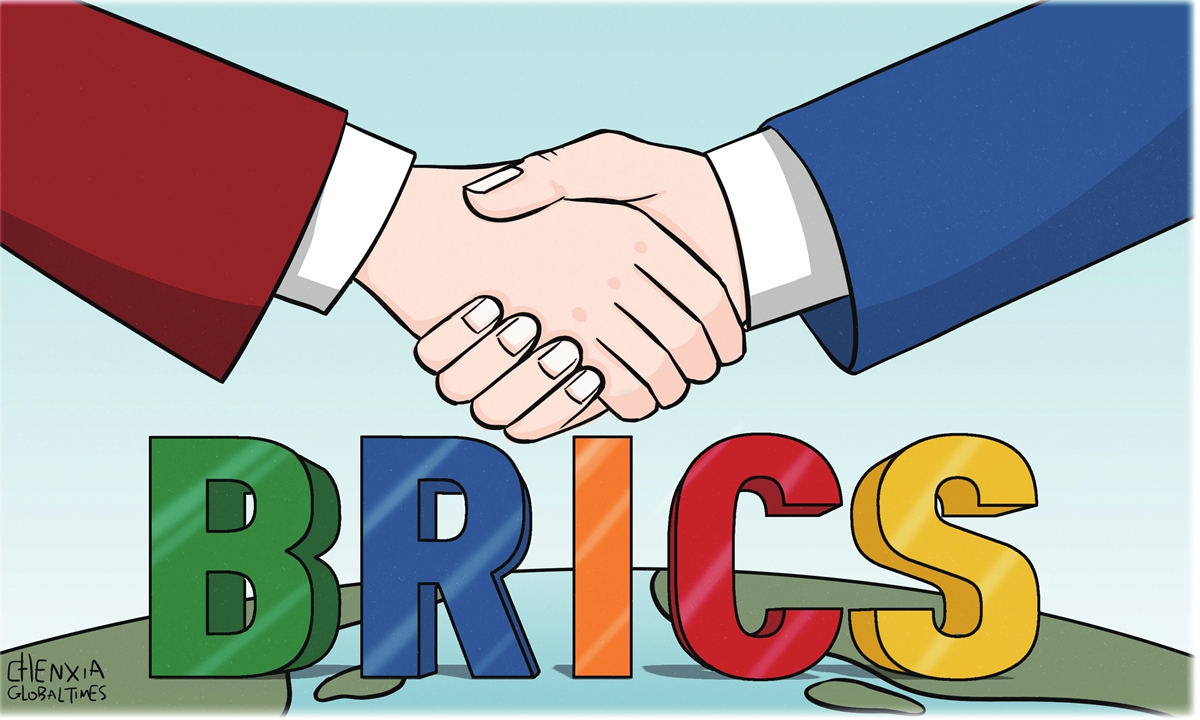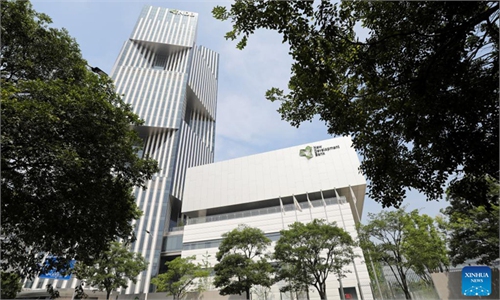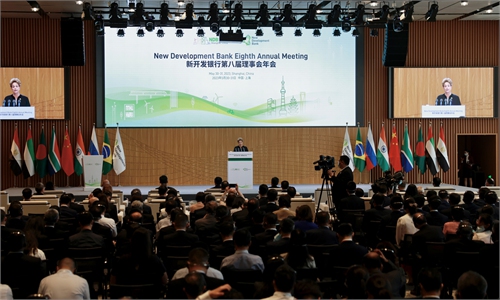
Illustration: Chen Xia/GT
A two-day meeting of foreign ministers from the BRICS countries is being held in Cape Town, South Africa starting from Thursday. The BRICS mechanism is expanding and has strong momentum. Recently, South Africa's BRICS Sherpa, Anil Sooklal, said that 19 countries have formally or informally approached the body to become members as it prepares to hold its annual summit in South Africa. Amid intensifying competition among major powers, why is the BRICS mechanism so attractive?
As a global governance platform built by large developing economies, the new vision of global governance advocated by the BRICS mechanism has great appeal. The global landscape has undergone unprecedented changes, and the pattern of global governance has failed to adapt to such changes. In the current situation, it is urgent for developing countries to strengthen solidarity and further promote a multipolar, equal and democratic international order based on cooperation, mutual respect, and collective decision-making. BRICS is an important force for advancing progressive changes in the global governance system, so that it might achieve more representative and equitable global governance, promote more inclusive global growth, and build a peaceful, stable, and prosperous world.
The successful establishment and operation of BRICS international institutions, such as the New Development Bank (NDB) and the Contingent Reserve Arrangement (CRA), have fully demonstrated the effectiveness of the BRICS mechanism. The NDB is the first multilateral development bank established and led by developing and emerging economies, which is of great significance in enhancing the attractiveness of the BRICS mechanism. As a South-South cooperation-oriented multilateral development bank, the NDB has achieved institutional innovation in four aspects: governance structure, country systems, local currency financing and sustainable infrastructure projects.
In terms of governance structure, the NDB differs from the World Bank, as its founding members have equal voting rights, and no country has a veto. This ensures equality and mutual respect among the five countries. With regard to relations with borrowing countries, the NDB follows a demand-driven approach and maintains close relationships with its clients, setting procurement, environmental and social governance policies based on the different systems of countries. In terms of investment and financing, the NDB explores the use of member countries' local currencies, which effectively reduces the exchange rate risk of loan projects and boosts the local capital markets of member countries. As for investment projects, the NDB focuses on sustainable infrastructure projects, including renewable energy, digital infrastructure, smart cities, water and sanitation facilities, etc.
The CRA is a significant effort by developing and emerging economies to establish a collective financial safety net in response to the risks posed by the financial crisis. It aims to overcome geographical limitations and strengthen the collective defense capability of BRICS countries against external shocks, thereby enhancing the influence of developing countries in the international financial system.
As the Russia-Ukraine conflict continues to escalate, the BRICS countries' position of promoting peace and negotiations further enhances the attractiveness of its mechanism. The BRICS countries adhere to multilateralism, respect the legitimate security concerns of all countries, and support a comprehensive solution to the Russia-Ukraine conflict through dialogue and negotiations. Additionally, the BRICS countries express concern about the humanitarian situation in and around Ukraine and advocate for all efforts to provide humanitarian assistance. At the same time, the BRICS countries are particularly concerned about the aftermath of unilateral sanctions on world economic recovery, supply chain stability, energy and food security, as well as the serious shock to the implementation of the 2030 Agenda for Sustainable Development. The BRICS countries call for effectively addressing the concerns of most developing countries to ensure that the economies and livelihoods of all countries are not affected.
Under accelerated evolution, human society is facing unprecedented challenges and the world has entered a turbulent period. The BRICS countries are committed to advancing the reform of the global governance system and increasing participation of emerging and developing economies in global decision-making. Meanwhile, the BRICS countries aim to staunchly safeguard the international system with the UN at its core, uphold the authority of the UN and the principles of the UN Charter, join hands to develop a more fair and reasonable international order, actively respond to the expectations of all parties, and steadily push forward the expansion, while constantly expanding the "circle of friends." In summary, the BRICS mechanism is a booster for shaping the prestige of emerging countries in a multipolar world.
The author is a professor at the School of International Relations and Public Affairs of Fudan University. opinion@globaltimes.com.cn


